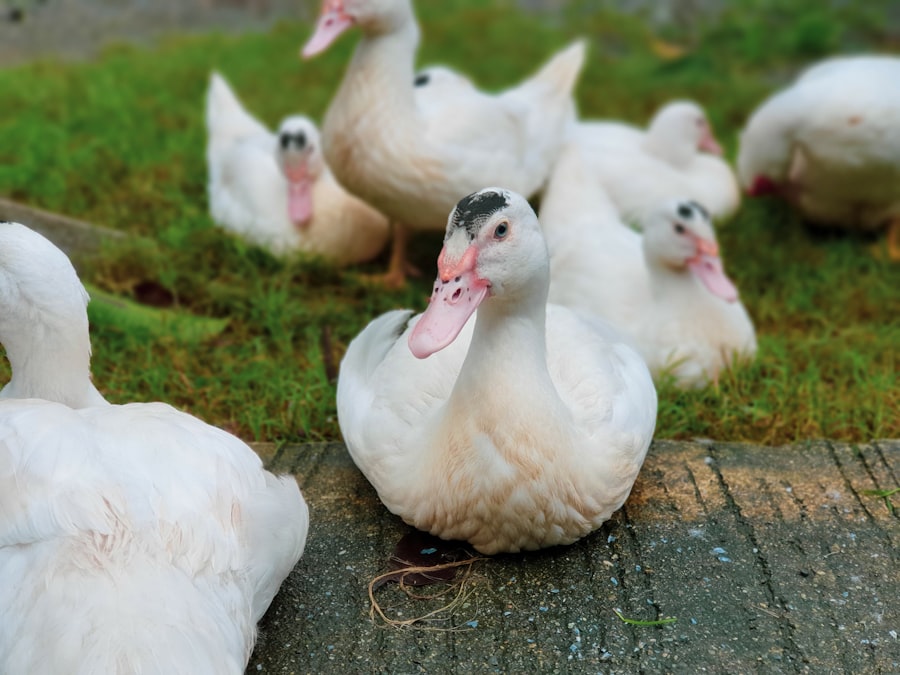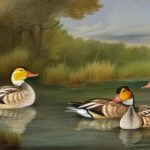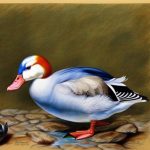Rural King Ducks, also known as Khaki Campbell ducks, are a popular breed of domestic duck that originated in England in the late 19th century. They were developed by Adele Campbell, who crossed Fawn and White Indian Runner ducks with Rouen and Mallard ducks to create a breed that was prolific egg layers and excellent foragers. Rural King Ducks are highly valued for their ability to lay a large number of eggs, making them a popular choice for small-scale and backyard poultry keepers. They are also known for their friendly and sociable nature, making them a great addition to any homestead or farm.
Rural King Ducks are medium-sized ducks with a sleek and upright posture. They have a khaki-colored plumage that is often described as being similar to the color of a wild duck. Their beaks are a dark olive green, and their legs and feet are a similar color. These ducks have a slender and athletic build, with a long and graceful neck. Their overall appearance is both elegant and practical, making them a beautiful and functional addition to any flock. With their charming looks and excellent egg-laying abilities, Rural King Ducks have become a favorite among poultry enthusiasts around the world.
Table of Contents
- 1 Characteristics and Physical Appearance of Rural King Ducks
- 2 Behavioral Traits and Temperament of Rural King Ducks
- 3 Housing and Care Requirements for Rural King Ducks
- 4 Feeding and Nutrition for Rural King Ducks
- 5 Health and Common Diseases of Rural King Ducks
- 6 Breeding and Reproduction of Rural King Ducks
- 7 FAQs
- 7.1 What are the different breeds of ducks available at Rural King?
- 7.2 What are the characteristics of Pekin ducks?
- 7.3 What are the characteristics of Khaki Campbell ducks?
- 7.4 What are the characteristics of Rouen ducks?
- 7.5 What are the characteristics of Mallard ducks?
- 7.6 What should I consider before raising ducks from Rural King?
Key Takeaways
- Rural King Ducks are a popular breed known for their hardiness and adaptability to various climates.
- They have a distinctive appearance with a broad, deep body, and a unique color pattern of white with black or blue markings.
- Rural King Ducks are known for their friendly and calm temperament, making them suitable for both backyard and commercial settings.
- Proper housing for Rural King Ducks should include a secure coop with access to water for swimming and foraging areas.
- A balanced diet for Rural King Ducks should include a mix of commercial feed, fresh greens, and access to clean water.
Characteristics and Physical Appearance of Rural King Ducks
Rural King Ducks are known for their distinctive khaki-colored plumage, which gives them their name. Their feathers are a blend of brown and green tones, creating a beautiful and natural appearance. The males and females of this breed have similar plumage, making it difficult to distinguish between the sexes based on color alone. However, males are typically slightly larger than females and may have a more pronounced curl to their tail feathers. Both males and females have a sleek and upright posture, with a long and elegant neck that adds to their overall graceful appearance.
In addition to their striking plumage, Rural King Ducks have dark olive green beaks, legs, and feet. This coloration adds to their overall aesthetic appeal and gives them a unique and attractive look. Their beaks are slightly upturned, which is characteristic of many duck breeds and is well-suited for their foraging habits. Overall, Rural King Ducks have a sleek and athletic build that allows them to move with agility and grace. Their physical appearance reflects their practicality as both egg layers and foragers, making them a valuable addition to any poultry flock.
Behavioral Traits and Temperament of Rural King Ducks
Rural King Ducks are known for their friendly and sociable nature, making them a joy to keep as pets or on the farm. They are generally calm and docile birds that are easy to handle and interact with. These ducks are also known for their curious and inquisitive personalities, often exploring their surroundings with enthusiasm. They are highly adaptable birds that can thrive in a variety of environments, making them well-suited for both rural and urban settings.
In addition to their friendly nature, Rural King Ducks are also known for their excellent foraging abilities. They are active and energetic birds that enjoy spending time outdoors, where they can search for insects, plants, and other natural food sources. This makes them an ideal choice for those looking to integrate ducks into a free-range or pasture-based farming system. Rural King Ducks are also known for their strong maternal instincts, making them excellent mothers when it comes to hatching and raising ducklings. Overall, their friendly demeanor, adaptability, and strong foraging instincts make Rural King Ducks a valuable addition to any poultry flock.
Housing and Care Requirements for Rural King Ducks
When it comes to housing Rural King Ducks, it’s important to provide them with a safe and secure environment that meets their specific needs. A well-ventilated coop or shelter is essential to protect them from predators and the elements. The coop should also have nesting boxes filled with straw or shavings where the ducks can lay their eggs. Additionally, providing access to a secure outdoor area where the ducks can forage and exercise is important for their overall health and well-being.
In terms of care requirements, Rural King Ducks need access to clean water for drinking and bathing. They should also be provided with a balanced diet that includes commercial duck feed as well as access to natural forage such as grass, insects, and aquatic plants. Regular cleaning of the coop or shelter is essential to maintain a healthy living environment for the ducks. It’s also important to monitor the ducks for signs of illness or injury and seek veterinary care when necessary.
Overall, providing proper housing and care for Rural King Ducks is essential for their health and well-being. By meeting their specific needs for shelter, space, water, and nutrition, poultry keepers can ensure that their ducks thrive and remain productive members of the flock.
Feeding and Nutrition for Rural King Ducks
Feeding Rural King Ducks a balanced diet is essential for their overall health and productivity. A high-quality commercial duck feed that is specifically formulated for laying ducks is an important part of their diet. This feed should contain the necessary nutrients, vitamins, and minerals to support egg production and overall health. In addition to commercial feed, Rural King Ducks should also have access to natural forage such as grass, insects, aquatic plants, and other sources of protein.
Providing access to clean water is also essential for the health of Rural King Ducks. Ducks need water not only for drinking but also for bathing and preening their feathers. It’s important to provide a shallow water source that allows the ducks to fully submerge their heads while still being safe from drowning. Regularly cleaning and refilling the water source is important to prevent the buildup of bacteria and algae.
In addition to commercial feed and natural forage, supplementing the ducks’ diet with crushed oyster shells or another source of calcium can help support strong eggshells. It’s also important to monitor the ducks’ body condition and adjust their diet as needed to maintain a healthy weight. By providing a balanced diet that meets their nutritional needs, poultry keepers can ensure that Rural King Ducks remain healthy and productive members of the flock.
Health and Common Diseases of Rural King Ducks

Like all poultry, Rural King Ducks are susceptible to certain health issues and diseases that can impact their well-being. Common health problems in ducks include respiratory infections, parasites, bumblefoot, and egg binding in females. It’s important for poultry keepers to monitor their ducks regularly for signs of illness or injury so that they can seek veterinary care when necessary.
Preventative measures such as providing clean water, proper nutrition, and a clean living environment can help reduce the risk of health issues in Rural King Ducks. Regular cleaning of the coop or shelter, as well as providing access to fresh water for drinking and bathing, can help prevent the spread of bacteria and parasites. Additionally, practicing good biosecurity measures can help reduce the risk of introducing diseases into the flock.
When it comes to treating health issues in ducks, it’s important to work with a veterinarian who has experience with poultry. Seeking professional care at the first sign of illness can help prevent the spread of disease within the flock and improve the chances of successful treatment. By staying vigilant and proactive about the health of their ducks, poultry keepers can help ensure that Rural King Ducks remain healthy and productive members of the flock.
Breeding and Reproduction of Rural King Ducks
Breeding Rural King Ducks can be a rewarding experience for poultry enthusiasts who are interested in hatching ducklings or expanding their flock. When it comes to breeding these ducks, it’s important to provide them with a suitable nesting area where they can lay their eggs in privacy. Nesting boxes filled with straw or shavings can provide a comfortable environment for the ducks to lay their eggs.
Rural King Ducks are known for their strong maternal instincts, making them excellent mothers when it comes to hatching and raising ducklings. However, some poultry keepers may choose to use an incubator to hatch duck eggs instead. Incubating duck eggs requires careful monitoring of temperature and humidity levels to ensure successful hatching.
Once the ducklings hatch, they should be provided with a warm and safe environment where they can grow and develop. Brooding pens equipped with heat lamps or brooders can provide the necessary warmth for young ducklings. It’s important to provide access to clean water, balanced nutrition, and protection from predators during this critical stage of development.
Overall, breeding Rural King Ducks requires careful planning and attention to detail in order to ensure successful hatching and healthy ducklings. By providing the necessary resources and support for breeding ducks, poultry keepers can help expand their flock while maintaining the health and well-being of their birds.
If you’re considering raising rural king ducks, you may also be interested in learning about the best flooring options for your chicken coop. Poultry Wizard offers a helpful article on the topic, providing insights into the different types of flooring materials and their benefits for your coop. Check out their article on choosing the right floor for your chicken coop to ensure a comfortable and healthy environment for your ducks and other poultry.
FAQs
What are the different breeds of ducks available at Rural King?
At Rural King, you can find a variety of duck breeds including Pekin, Khaki Campbell, Rouen, and Mallard ducks.
What are the characteristics of Pekin ducks?
Pekin ducks are known for their white feathers, orange bills, and calm temperament. They are a popular choice for meat production due to their fast growth rate.
What are the characteristics of Khaki Campbell ducks?
Khaki Campbell ducks are known for their khaki-colored feathers and excellent egg-laying abilities. They are a popular choice for backyard duck enthusiasts.
What are the characteristics of Rouen ducks?
Rouen ducks are known for their striking plumage, which resembles that of a Mallard duck. They are often raised for their meat and as ornamental birds.
What are the characteristics of Mallard ducks?
Mallard ducks are known for their colorful iridescent feathers and are commonly found in the wild. They are also popular for ornamental purposes in domestic settings.
What should I consider before raising ducks from Rural King?
Before raising ducks, it’s important to consider the space, housing, and dietary needs of the specific breed. Additionally, proper care and protection from predators should be taken into account.
Meet Walter, the feathered-friend fanatic of Florida! Nestled in the sunshine state, Walter struts through life with his feathered companions, clucking his way to happiness. With a coop that’s fancier than a five-star hotel, he’s the Don Juan of the chicken world. When he’s not teaching his hens to do the cha-cha, you’ll find him in a heated debate with his prized rooster, Sir Clucks-a-Lot. Walter’s poultry passion is no yolk; he’s the sunny-side-up guy you never knew you needed in your flock of friends!







